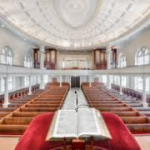The Marks of a True Church and the Ordinary Means of Grace.
Monthly Archives: January 2015
The Marks of the Church
If you move to a new town,” you are likely to confront a bewildering array of possibilities. Perhaps you already have some fairly definite ideas of what you want in a church. You may be looking for a good youth group or active senior citizens group. You may want a powerful preacher or a certain kind of music. You may be very loyal to one denomination or you may like to “shop around.”
What should you be looking for in choosing a new church? Your first concern should be that the church be a “true church.” You do not want to choose a church that is part of a sect or a cult. You do not want a church that still bears the name of church, but whose lampstand Christ has removed (Revelation 1–3). How do you recognize a true church? This question was acute at the time of the Reformation. The Roman Catholic Church in the sixteenth century basically argued that Christ preserved the true church through the work of the Pope, the bishop of Rome. The true church is easy to recognize because it is in fellowship with the Pope. Any church that does not submit to the Pope is a false church.
The Reformers did not accept Rome’s approach. They argued that the true church is not marked by submission to a supposedly infallible apostolic office—the Papacy—but by acceptance of apostolic truth. Luther declared that “the sole, uninterrupted, infallible mark of the church has always been the Word.” The true church is marked by submission to the Scriptures.
Anyone familiar with the Reformation knows the importance of the Bible in the formation of Protestantism. Against the claims of the medieval church that tradition, bishops, and councils were authoritative along with the Bible, the Reformers insisted that the Bible is the only absolute authority for Christians. The Bible must judge all traditions and church officers and assemblies. It is not surprising then that the Reformers taught that the centrality of the Word is the key mark of the true church. As one of the Reformation confessions put it, the true church is known “in short, if all things are managed according to the pure Word of God, all things contrary thereto rejected, and Jesus Christ acknowledged as the only Head of the Church” (Belgic Confession, Article 29).
This general recognition of the Word as the mark of the true church came to specific expression. Among the Reformed churches, eventually three marks were identified: faithful preaching of the Word, faithful administration of the sacraments, and faithful exercise of discipline.
In focusing on the marks of the church, the Reformers were not saying that all a good church needs to have are the marks of the church. They focused on the marks because the marks make the true church recognizable. The church of Christ has many more characteristics than the three marks. But these characteristics—we might mention prayer, fellowship, devotion—are not so easy to observe. The marks are important because they display the faithfulness of the church.
PREACHING
Faithful preaching was the first mark of the true church because preaching most directly brings God’s Word to His people. The Reformers stressed that God’s great means of speaking to His people was by preaching. Luther talked of the several forms that the Word takes. The first is the eternal Word, the second person of the Trinity. The second is the incarnate Word, Jesus. The third is the inscripturated Word, the Bible. The fourth is the “shouted Word,” the preaching. At the heart of Christian worship and life is the ministry of the Word in preaching. If preaching is not faithful, the life of the church cannot be faithful. It is an essential mark of the true church. Continue reading
Self Discipline
 by there can be no advancement in grace. Before other disciplines can be administered, whether in the home, business, or church, there first must be self-discipline.
by there can be no advancement in grace. Before other disciplines can be administered, whether in the home, business, or church, there first must be self-discipline.
Admittedly, personal discipline is not a popular subject today. In our society, any insistence upon self-discipline is largely resisted, even among many Christians. Legalism, they cry, defending their rights of Christian liberty. These free-spirited believers maintain that discipline restricts their freedom in Christ, binding them in a spiritual straightjacket.
But many of these believers have so abused their freedom in Christ that they have virtually no spiritual discipline. They have swung the pendulum so drastically toward Christian liberty that their spiritual lives are out of balance. Such neglect of self-discipline prolongs their spiritual immaturity, leaving them with little self-control to resist temptation and sin.
Let us be clear, if there is no discipline, there is no discipleship. If we do not discipline ourselves, God Himself will discipline us (Heb. 12:5–11). One way or another, there will be discipline in our lives. Given our tendency toward sin, we must discipline ourselves for the purpose of godliness, lest we be disciplined by God.
WHAT IS SELF-DISCIPLINE?
The Greek word translated “discipline” (enkrateia) comes from the root krat, which denotes power or lordship. Self-discipline means to exercise power over one’s self. It is the ability to keep one’s self under control. The word indicates self-mastery over one’s inner desires, thoughts, actions, and words. It is the control a believer must exercise over his life (Gal. 5:23).
This same word is used in 1 Corinthians 7:9 to indicate the “self-control” one must show over unlawful sexual desires. Likewise, elders must be “self-controlled” (Titus 1:8), disciplined in their inward attitudes and outward actions. Mastery of self is non-negotiable for spiritual leadership.
The opposite of self-discipline is a self-indulgent lifestyle that produces “the works of the flesh” (Gal. 5:19-21). Any lack of self-control will inevitably result in sinful deeds. But where self-mastery exists, there is a strong resistance to sensual appetites and sinful choices. Self-rule brings every thought, word, and deed captive to the obedience of Christ (2 Cor. 10:5). Any advance in personal holiness demands self-control.
WHAT SELF-DISCIPLINE IS NOT
To best understand what self-discipline is, we need to see what it is not. Two erroneous views of the Christian life—Pelagianism and semi-Pelagianism—distort the truth of self-discipline. Continue reading

